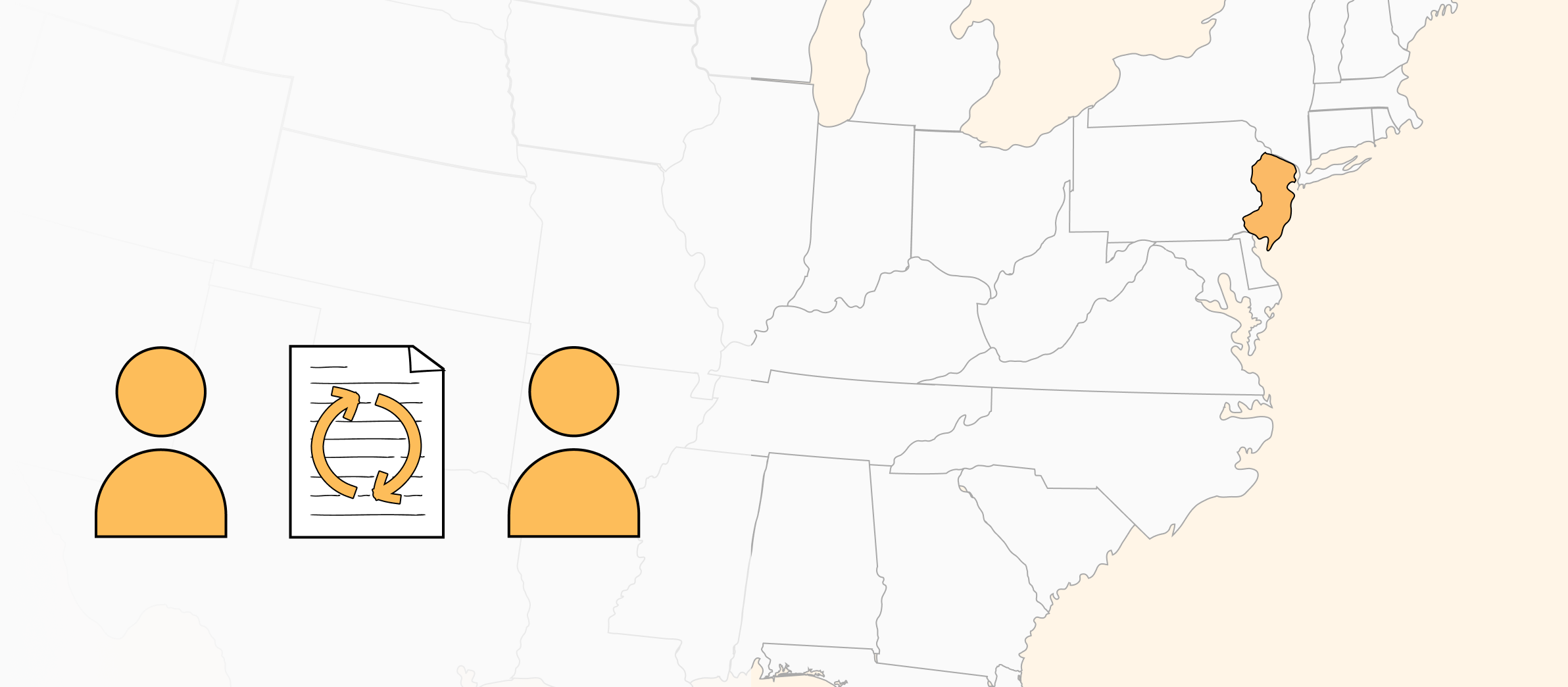

New Jersey law does not grant tenants, by default, the right to sublease. Instead, they must have explicit, written consent from the landlord to do so. If such consent was not included in the lease, the landlord reserves the right to deny future requests.
Because state law does not inherently give tenants the right to sublet, a tenant does have to get the landlord’s explicit written consent to do so. This consent could be given in the original lease agreement or through a separately signed agreement.
Even if permission to sublet is granted, a landlord is allowed to screen potential subtenants and deny them for legally acceptable reasons.
“The Landlord and Tenant agree that the Tenant shall not have the express and unqualified rights to sublease the rental premise.”
A signed lease may already explicitly state that the tenant is not allowed to sublease. In this situation, a tenant’s only option is to ask the landlord to make an amendment to the lease.
“The Tenant shall not assign or sublet any part of the leased premises without prior written consent of the Landlord.”’
In this situation, a tenant could be allowed to sublet, but must receive additional written consent from the landlord prior to doing so. However, if asked, the landlord is not required to grant such permission.
“The Landlord and Tenant agree that the Tenant shall have the express and unqualified rights to sublease the rental premise.”
The tenant can immediately begin subleasing the property without needing to get the landlord’s permission. It may also mean the tenant does not even have to inform the landlord of their intent to do so, depending on if this clause doesn’t explicitly require this.
If a lease is silent about subleasing, it’s illegal for a tenant to sublease without first getting the landlord’s permission. If asked, the landlord is not required to grant such permission.
Unless prior written consent has already been granted, a landlord can prohibit a tenant from subletting in New Jersey. A landlord reserves the right to deny any and all future requests from a tenant to sublease.
Usually, denials will occur if the prospective sublessee would be unable to meet the financial obligations of renting out the premises. Another situation where denial could occur is if there is a reason for the landlord to believe that the future sublessee is not reputable, and is of bad character that could potentially put the landlord in a worse position.
However, if prior consent was already explicitly granted in writing, such as in the lease agreement, a landlord cannot prohibit subletting under those previously agreed terms. The landlord’s only option would be to amend the lease or sign a new agreement to forbid subletting, which requires the agreement of both parties.
A tenant who subleases (“subtenant”) has the same rights and responsibilities as the original tenant. This means the subtenant is treated the same as any other tenant under New Jersey law when it comes to rights such as privacy, health and safety standards of a rental unit and due process for an eviction.
However, if certain rights are violated, subtenants in New Jersey cannot sue the original tenant’s landlord. Instead, a subtenant must sue the original tenant for the issue. The original tenant can then in turn sue the landlord if the issue is caused by the landlord (and isn’t remedied in a timely manner after being properly notified).
If the subtenant causes any damage, the most likely outcome is the landlord will subtract the cost of those damages from the original tenant’s security deposit. The original tenant would have to bring a claim against the subtenant to recover money lost from the security deposit.
Subtenants in illegal sublets do not automatically have the legal right to break the terms of their sublease. Even if the landlord did not consent to the sublease, the contract may still be considered valid between the subtenant and tenant.
Generally, any sort of legal action against an illegal subtenant will take the form of an eviction. Unless the lease states otherwise, landlords will give notice that the illegal subtenant has 30 days to vacate the premises. For those illegal subtenants that still do not leave, the next step would be for the landlord to take them to Small Claims Court, where the filing fee starts at $30, increased by $5 for every other defendant added to the claim.
If a tenant subleases their unit without the landlord’s explicit written permission, the tenant is in breach of their lease. In New Jersey, a lease violation permits a landlord to evict the tenant and subtenant (starting with a 30 Day Notice to Comply or Vacate) and to sue the original tenant for any resulting damages.
In addition to the landlord, the subtenant also may have grounds to take legal action if the original tenant sublet the unit illegally.
Landlords in New Jersey must provide the tenant a chance to fix the lease violation, such as illegally subletting. A landlord must provide the tenant with a 30 Day Notice to Comply or Vacate.
These eviction notice types give the original tenant 30 calendar days to take action (move out or fix the issue). Once the notice expires, if the tenant has not taken the required action, the landlord may then proceed with the second step of the eviction process, which entails filing a petition with the county court. This next step in the eviction process takes about 1-3 months.